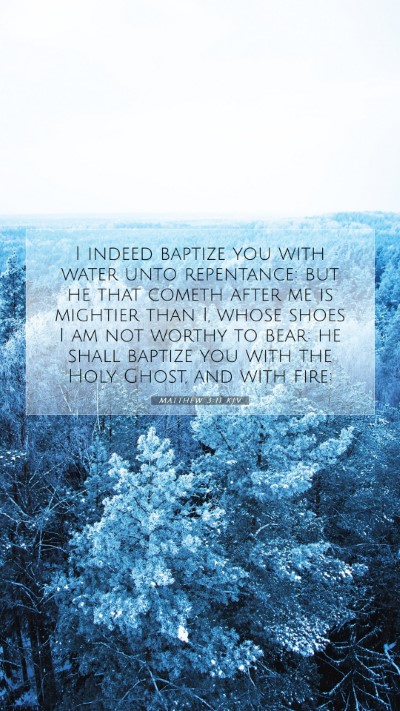Understanding Matthew 3:11 - Insights and Commentary
Bible Verse: Matthew 3:11 - "I indeed baptize you with water unto repentance: but he that cometh after me is mightier than I, whose shoes I am not worthy to bear: he shall baptize you with the Holy Ghost, and with fire."
This verse is rich in meaning and provides significant insights into John's ministry and the coming of Jesus. Below are detailed explanations and interpretations drawn from public domain commentaries.
Contextual Analysis
In considering the meaning of Bible verses, it is vital to examine the context. Matthew 3:11 is set within the broader narrative of John the Baptist's role as the forerunner to Christ. He is calling people to repentance and preparing them for the coming Messiah.
Exegesis of Key Phrases
- "I indeed baptize you with water unto repentance": John highlights the temporary nature of his baptism, which symbolizes repentance but does not impart the spiritual transformation that will come through Christ.
- "but he that cometh after me is mightier than I": This refers to Jesus. John acknowledges his own limitations and the supremacy of Christ, emphasizing the divine power and authority of Jesus.
- "whose shoes I am not worthy to bear": This phrase illustrates John's humility and recognition of his lowly position in comparison to Christ. It indicates the cultural significance of foot-washing and the servant's role in society.
- "he shall baptize you with the Holy Ghost, and with fire": Here, John anticipates the transformative baptism Jesus will provide, which will not only cleanse but empower believers through the Holy Spirit.
Commentary Insights
According to Matthew Henry, this verse juxtaposes the superficiality of John's baptism with the profound, life-changing baptism offered by Jesus. It underscores the transition from an external rite to an internal spiritual experience. Albert Barnes emphasizes that John's baptism was preparatory, leading believers to expect the coming of the Holy Spirit, which is essential for true transformation and empowerment in the Christian life.
Adam Clarke adds that the use of "fire" suggests purification, as fire tests and refines, aligning with the process of sanctification that Christians undergo through the Holy Spirit.
Theological Implications
This verse embodies significant Bible verse interpretations. It presents themes of repentance, purification, and the empowering presence of the Holy Spirit. It reflects Jesus' dual role as both Savior and Holy Spirit baptizer. Understanding these implications is crucial for those engaged in Bible study topics related to the nature of Christian growth and the workings of the Holy Spirit in the believer's life.
Application for Daily Life
For believers today, the application of Matthew 3:11 involves recognizing the need for both repentance and the empowering work of the Holy Spirit. It serves as a reminder that while initial steps in faith may involve acknowledgment of sin (baptism of John), true transformation comes through a deeper relationship with Christ that includes the work of the Holy Spirit.
Cross References
- Acts 1:5: "For John truly baptized with water; but ye shall be baptized with the Holy Ghost not many days hence." - This verse reaffirms John's words about the baptism of the Holy Spirit.
- John 1:33: "And I knew him not: but he that sent me to baptize with water, the same said unto me, Upon whom thou shalt see the Spirit descending, and remaining on him, the same is he which baptizeth with the Holy Ghost." - This highlights John's prophetic role in identifying Jesus as the one who baptizes with the Holy Spirit.
- Luke 3:16: "John answered, saying unto them all, I indeed baptize you with water; but one mightier than I cometh..." - Similar to Matthew 3:11, this verse emphasizes the mightiness of Christ.
Conclusion
In conclusion, Matthew 3:11 is a pivotal passage that encapsulates the essence of John's ministry and the anticipation of Jesus' transformative impact through the Holy Spirit. Those seeking biblical exegesis or Bible verse meanings will find this scripture to be a profound declaration of faith and a vital part of understanding the new covenant established by Christ.
Further Study Resources
For those delving deeper into this verse or similar passages, consider utilizing various Bible study resources such as:
- Bible study guides that focus on John the Baptist and his role in the New Testament.
- Online Bible study tools to explore commentaries and discussions on the Holy Spirit's work.
- Bible study lessons that tackle the themes of repentance and empowerment in the life of believers.


